Research Proposal: ECT Treatment and Cognitive Function in MDD
VerifiedAdded on 2021/06/15
|34
|6396
|53
Report
AI Summary
This research proposal investigates the impact of Electroconvulsive Therapy (ECT) on cognitive function in elderly patients diagnosed with Major Depressive Disorder (MDD). The study aims to determine the effectiveness of ECT compared to medication management on cognitive outcomes, addressing the controversy surrounding potential cognitive impairments post-treatment. Utilizing a qualitative research approach with cross-sectional interviews, the study will explore the lived experiences of patients, employing purposive sampling to gather data from a heterogeneous group. The research seeks to understand patients' perceptions of ECT acceptability and its effects on cognitive function, contributing to the existing body of literature by providing insights into the patient perspective and informing clinical practices. The proposal outlines the research design, methodology, and ethical considerations, with the goal of providing robust evidence regarding the impact of ECT on cognitive function in elderly patients.

Research proposal
Name of the student:
Name of the University:
Author’s note
1
Name of the student:
Name of the University:
Author’s note
1
Paraphrase This Document
Need a fresh take? Get an instant paraphrase of this document with our AI Paraphraser
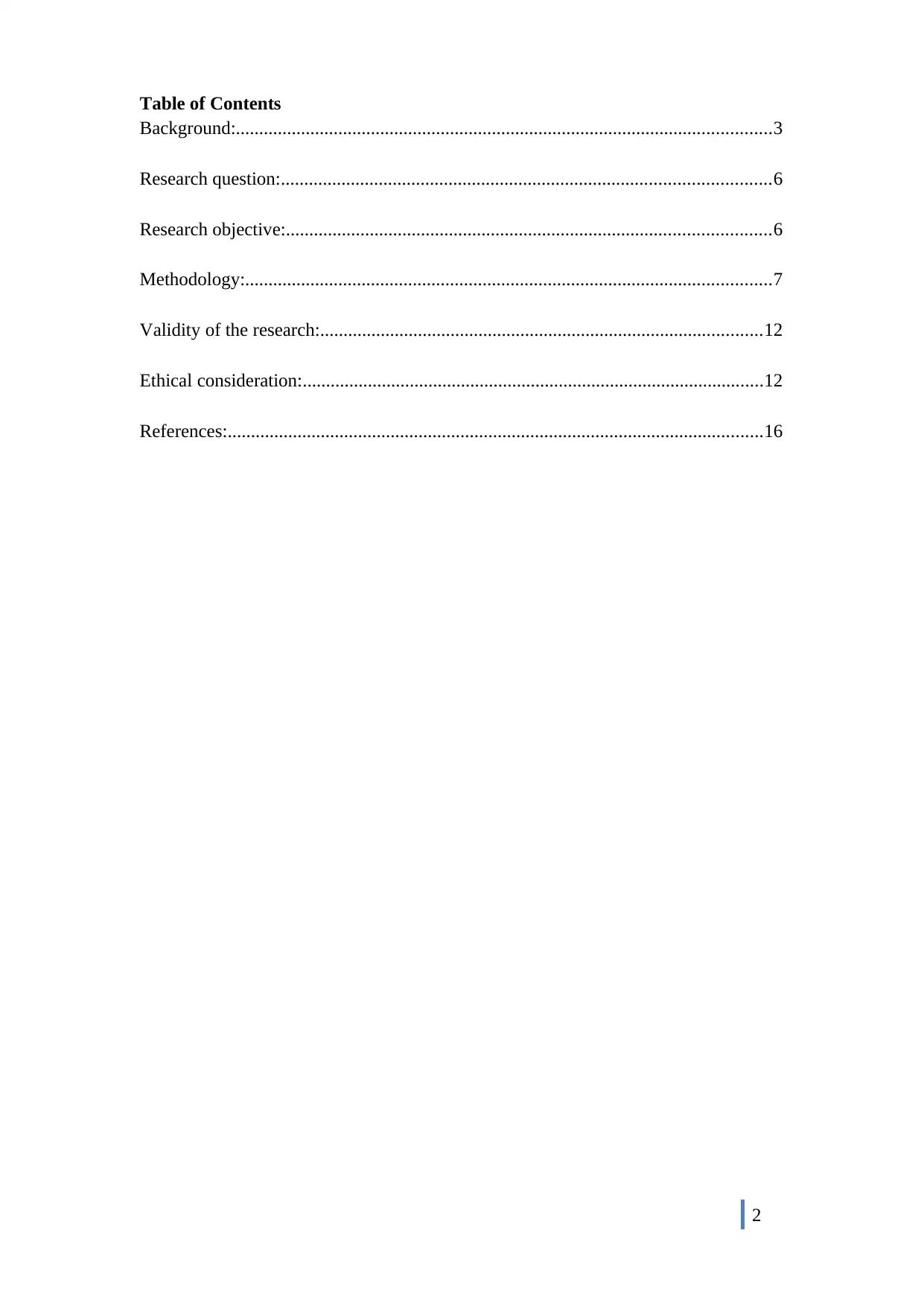
Table of Contents
Background:...................................................................................................................3
Research question:.........................................................................................................6
Research objective:........................................................................................................6
Methodology:.................................................................................................................7
Validity of the research:...............................................................................................12
Ethical consideration:...................................................................................................12
References:...................................................................................................................16
2
Background:...................................................................................................................3
Research question:.........................................................................................................6
Research objective:........................................................................................................6
Methodology:.................................................................................................................7
Validity of the research:...............................................................................................12
Ethical consideration:...................................................................................................12
References:...................................................................................................................16
2
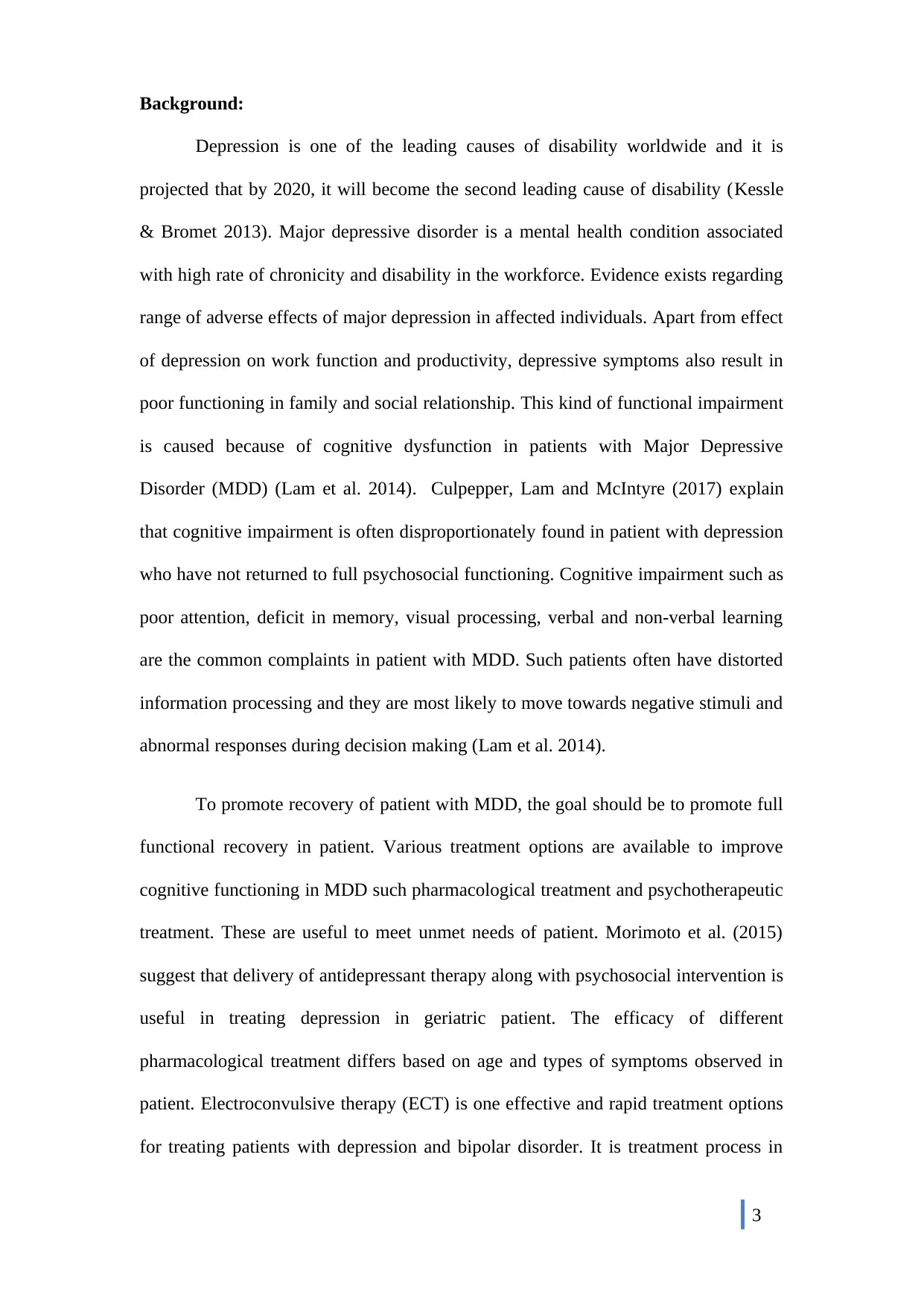
Background:
Depression is one of the leading causes of disability worldwide and it is
projected that by 2020, it will become the second leading cause of disability (Kessle
& Bromet 2013). Major depressive disorder is a mental health condition associated
with high rate of chronicity and disability in the workforce. Evidence exists regarding
range of adverse effects of major depression in affected individuals. Apart from effect
of depression on work function and productivity, depressive symptoms also result in
poor functioning in family and social relationship. This kind of functional impairment
is caused because of cognitive dysfunction in patients with Major Depressive
Disorder (MDD) (Lam et al. 2014). Culpepper, Lam and McIntyre (2017) explain
that cognitive impairment is often disproportionately found in patient with depression
who have not returned to full psychosocial functioning. Cognitive impairment such as
poor attention, deficit in memory, visual processing, verbal and non-verbal learning
are the common complaints in patient with MDD. Such patients often have distorted
information processing and they are most likely to move towards negative stimuli and
abnormal responses during decision making (Lam et al. 2014).
To promote recovery of patient with MDD, the goal should be to promote full
functional recovery in patient. Various treatment options are available to improve
cognitive functioning in MDD such pharmacological treatment and psychotherapeutic
treatment. These are useful to meet unmet needs of patient. Morimoto et al. (2015)
suggest that delivery of antidepressant therapy along with psychosocial intervention is
useful in treating depression in geriatric patient. The efficacy of different
pharmacological treatment differs based on age and types of symptoms observed in
patient. Electroconvulsive therapy (ECT) is one effective and rapid treatment options
for treating patients with depression and bipolar disorder. It is treatment process in
3
Depression is one of the leading causes of disability worldwide and it is
projected that by 2020, it will become the second leading cause of disability (Kessle
& Bromet 2013). Major depressive disorder is a mental health condition associated
with high rate of chronicity and disability in the workforce. Evidence exists regarding
range of adverse effects of major depression in affected individuals. Apart from effect
of depression on work function and productivity, depressive symptoms also result in
poor functioning in family and social relationship. This kind of functional impairment
is caused because of cognitive dysfunction in patients with Major Depressive
Disorder (MDD) (Lam et al. 2014). Culpepper, Lam and McIntyre (2017) explain
that cognitive impairment is often disproportionately found in patient with depression
who have not returned to full psychosocial functioning. Cognitive impairment such as
poor attention, deficit in memory, visual processing, verbal and non-verbal learning
are the common complaints in patient with MDD. Such patients often have distorted
information processing and they are most likely to move towards negative stimuli and
abnormal responses during decision making (Lam et al. 2014).
To promote recovery of patient with MDD, the goal should be to promote full
functional recovery in patient. Various treatment options are available to improve
cognitive functioning in MDD such pharmacological treatment and psychotherapeutic
treatment. These are useful to meet unmet needs of patient. Morimoto et al. (2015)
suggest that delivery of antidepressant therapy along with psychosocial intervention is
useful in treating depression in geriatric patient. The efficacy of different
pharmacological treatment differs based on age and types of symptoms observed in
patient. Electroconvulsive therapy (ECT) is one effective and rapid treatment options
for treating patients with depression and bipolar disorder. It is treatment process in
3
⊘ This is a preview!⊘
Do you want full access?
Subscribe today to unlock all pages.

Trusted by 1+ million students worldwide
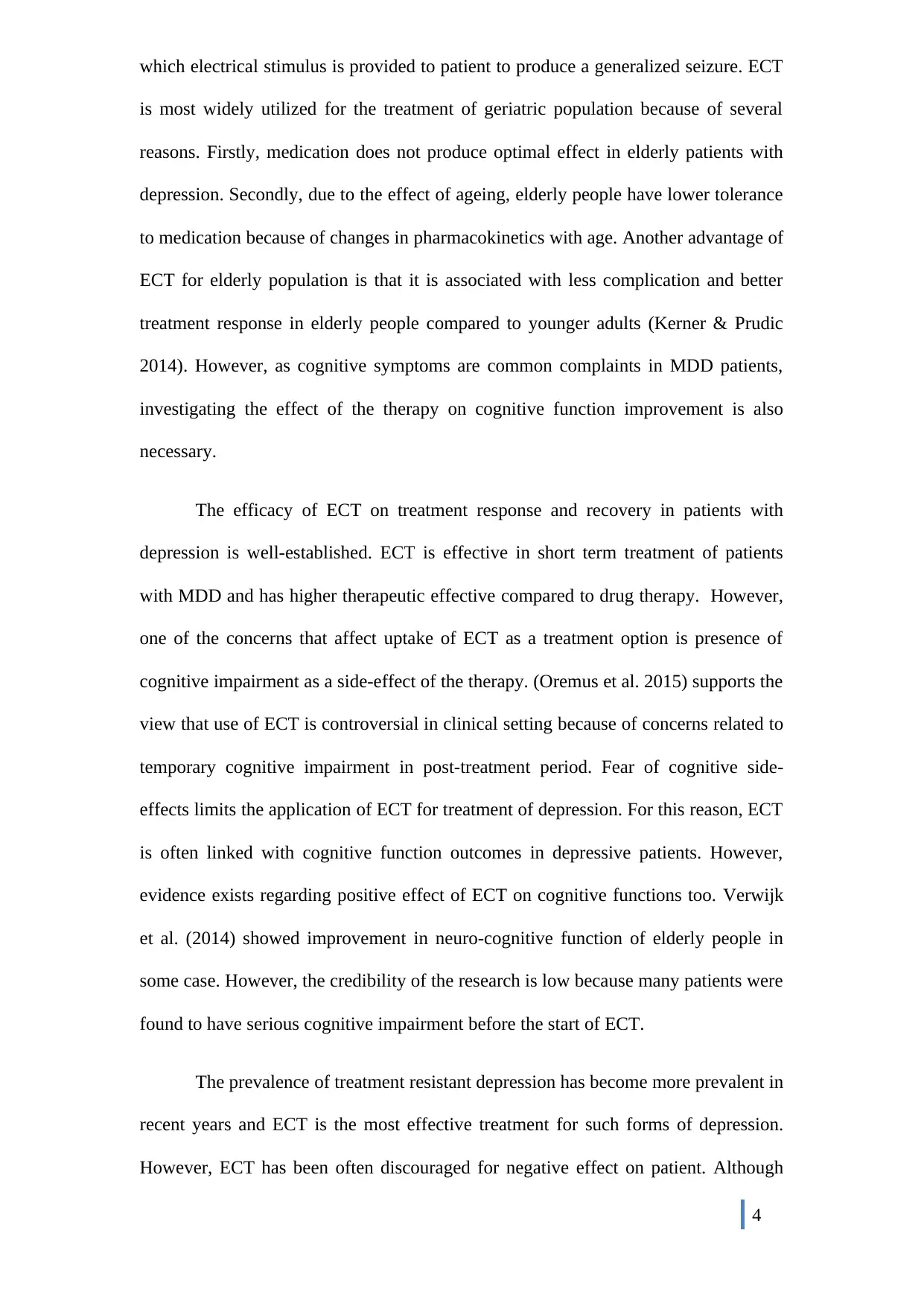
which electrical stimulus is provided to patient to produce a generalized seizure. ECT
is most widely utilized for the treatment of geriatric population because of several
reasons. Firstly, medication does not produce optimal effect in elderly patients with
depression. Secondly, due to the effect of ageing, elderly people have lower tolerance
to medication because of changes in pharmacokinetics with age. Another advantage of
ECT for elderly population is that it is associated with less complication and better
treatment response in elderly people compared to younger adults (Kerner & Prudic
2014). However, as cognitive symptoms are common complaints in MDD patients,
investigating the effect of the therapy on cognitive function improvement is also
necessary.
The efficacy of ECT on treatment response and recovery in patients with
depression is well-established. ECT is effective in short term treatment of patients
with MDD and has higher therapeutic effective compared to drug therapy. However,
one of the concerns that affect uptake of ECT as a treatment option is presence of
cognitive impairment as a side-effect of the therapy. (Oremus et al. 2015) supports the
view that use of ECT is controversial in clinical setting because of concerns related to
temporary cognitive impairment in post-treatment period. Fear of cognitive side-
effects limits the application of ECT for treatment of depression. For this reason, ECT
is often linked with cognitive function outcomes in depressive patients. However,
evidence exists regarding positive effect of ECT on cognitive functions too. Verwijk
et al. (2014) showed improvement in neuro-cognitive function of elderly people in
some case. However, the credibility of the research is low because many patients were
found to have serious cognitive impairment before the start of ECT.
The prevalence of treatment resistant depression has become more prevalent in
recent years and ECT is the most effective treatment for such forms of depression.
However, ECT has been often discouraged for negative effect on patient. Although
4
is most widely utilized for the treatment of geriatric population because of several
reasons. Firstly, medication does not produce optimal effect in elderly patients with
depression. Secondly, due to the effect of ageing, elderly people have lower tolerance
to medication because of changes in pharmacokinetics with age. Another advantage of
ECT for elderly population is that it is associated with less complication and better
treatment response in elderly people compared to younger adults (Kerner & Prudic
2014). However, as cognitive symptoms are common complaints in MDD patients,
investigating the effect of the therapy on cognitive function improvement is also
necessary.
The efficacy of ECT on treatment response and recovery in patients with
depression is well-established. ECT is effective in short term treatment of patients
with MDD and has higher therapeutic effective compared to drug therapy. However,
one of the concerns that affect uptake of ECT as a treatment option is presence of
cognitive impairment as a side-effect of the therapy. (Oremus et al. 2015) supports the
view that use of ECT is controversial in clinical setting because of concerns related to
temporary cognitive impairment in post-treatment period. Fear of cognitive side-
effects limits the application of ECT for treatment of depression. For this reason, ECT
is often linked with cognitive function outcomes in depressive patients. However,
evidence exists regarding positive effect of ECT on cognitive functions too. Verwijk
et al. (2014) showed improvement in neuro-cognitive function of elderly people in
some case. However, the credibility of the research is low because many patients were
found to have serious cognitive impairment before the start of ECT.
The prevalence of treatment resistant depression has become more prevalent in
recent years and ECT is the most effective treatment for such forms of depression.
However, ECT has been often discouraged for negative effect on patient. Although
4
Paraphrase This Document
Need a fresh take? Get an instant paraphrase of this document with our AI Paraphraser
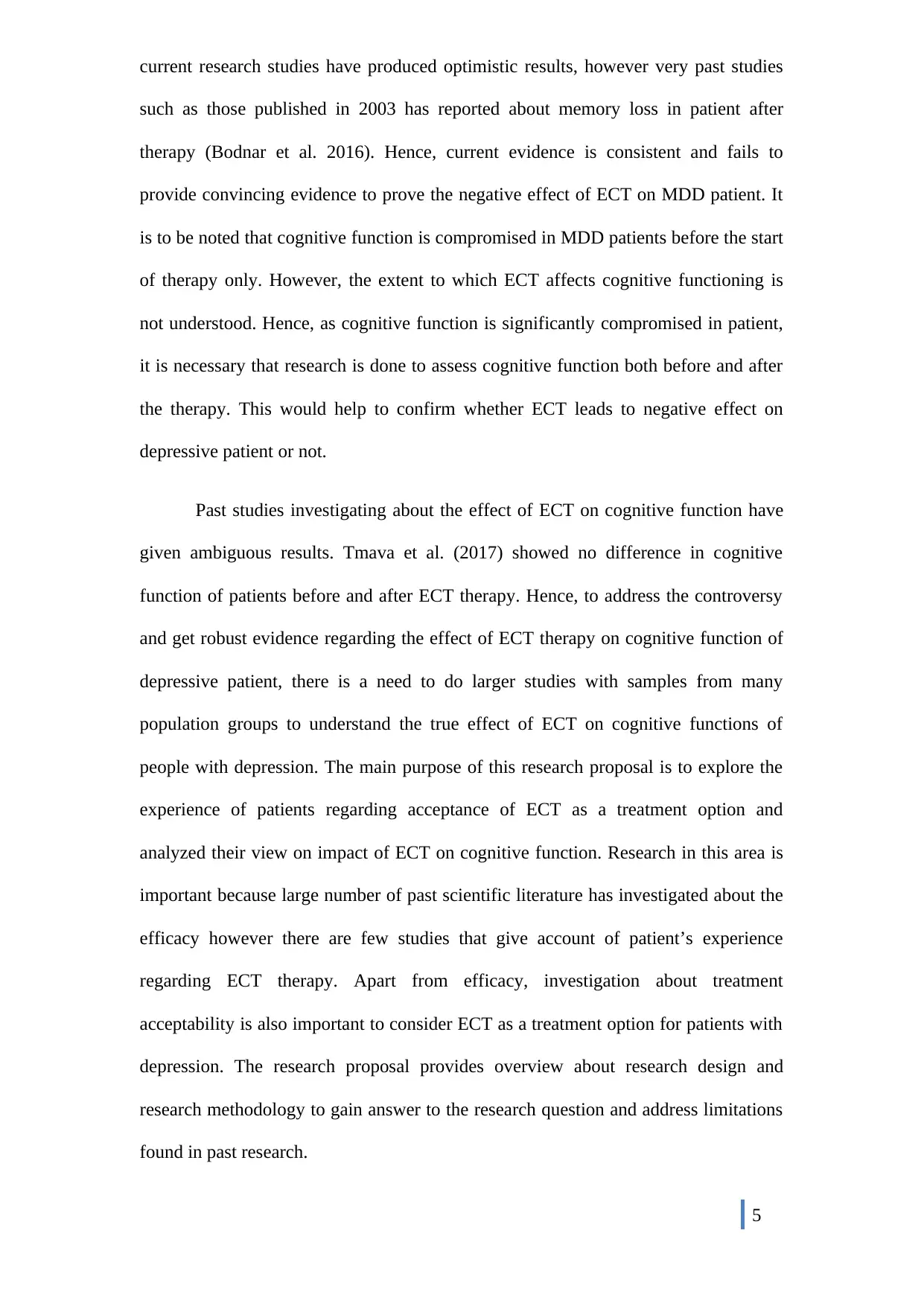
current research studies have produced optimistic results, however very past studies
such as those published in 2003 has reported about memory loss in patient after
therapy (Bodnar et al. 2016). Hence, current evidence is consistent and fails to
provide convincing evidence to prove the negative effect of ECT on MDD patient. It
is to be noted that cognitive function is compromised in MDD patients before the start
of therapy only. However, the extent to which ECT affects cognitive functioning is
not understood. Hence, as cognitive function is significantly compromised in patient,
it is necessary that research is done to assess cognitive function both before and after
the therapy. This would help to confirm whether ECT leads to negative effect on
depressive patient or not.
Past studies investigating about the effect of ECT on cognitive function have
given ambiguous results. Tmava et al. (2017) showed no difference in cognitive
function of patients before and after ECT therapy. Hence, to address the controversy
and get robust evidence regarding the effect of ECT therapy on cognitive function of
depressive patient, there is a need to do larger studies with samples from many
population groups to understand the true effect of ECT on cognitive functions of
people with depression. The main purpose of this research proposal is to explore the
experience of patients regarding acceptance of ECT as a treatment option and
analyzed their view on impact of ECT on cognitive function. Research in this area is
important because large number of past scientific literature has investigated about the
efficacy however there are few studies that give account of patient’s experience
regarding ECT therapy. Apart from efficacy, investigation about treatment
acceptability is also important to consider ECT as a treatment option for patients with
depression. The research proposal provides overview about research design and
research methodology to gain answer to the research question and address limitations
found in past research.
5
such as those published in 2003 has reported about memory loss in patient after
therapy (Bodnar et al. 2016). Hence, current evidence is consistent and fails to
provide convincing evidence to prove the negative effect of ECT on MDD patient. It
is to be noted that cognitive function is compromised in MDD patients before the start
of therapy only. However, the extent to which ECT affects cognitive functioning is
not understood. Hence, as cognitive function is significantly compromised in patient,
it is necessary that research is done to assess cognitive function both before and after
the therapy. This would help to confirm whether ECT leads to negative effect on
depressive patient or not.
Past studies investigating about the effect of ECT on cognitive function have
given ambiguous results. Tmava et al. (2017) showed no difference in cognitive
function of patients before and after ECT therapy. Hence, to address the controversy
and get robust evidence regarding the effect of ECT therapy on cognitive function of
depressive patient, there is a need to do larger studies with samples from many
population groups to understand the true effect of ECT on cognitive functions of
people with depression. The main purpose of this research proposal is to explore the
experience of patients regarding acceptance of ECT as a treatment option and
analyzed their view on impact of ECT on cognitive function. Research in this area is
important because large number of past scientific literature has investigated about the
efficacy however there are few studies that give account of patient’s experience
regarding ECT therapy. Apart from efficacy, investigation about treatment
acceptability is also important to consider ECT as a treatment option for patients with
depression. The research proposal provides overview about research design and
research methodology to gain answer to the research question and address limitations
found in past research.
5
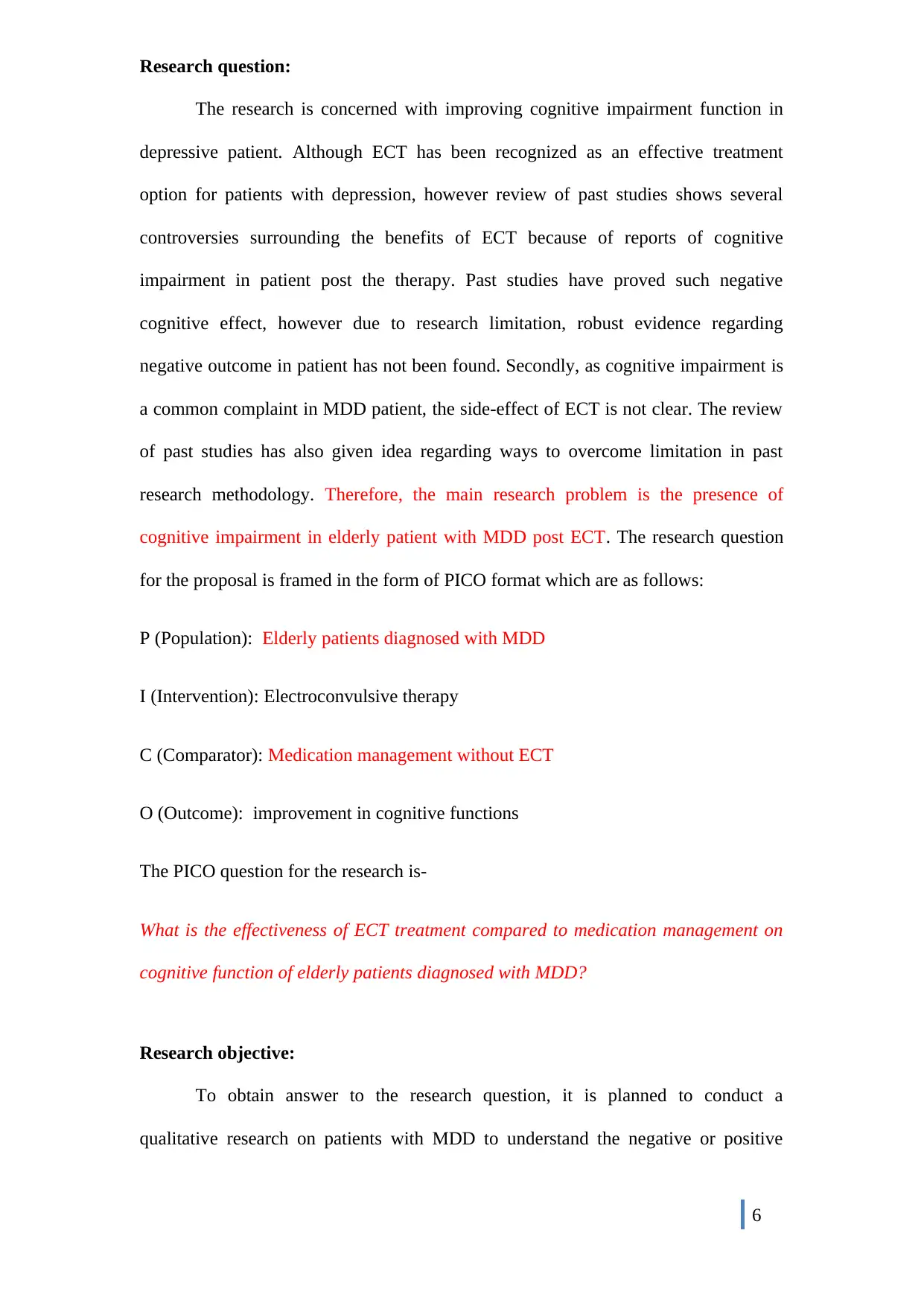
Research question:
The research is concerned with improving cognitive impairment function in
depressive patient. Although ECT has been recognized as an effective treatment
option for patients with depression, however review of past studies shows several
controversies surrounding the benefits of ECT because of reports of cognitive
impairment in patient post the therapy. Past studies have proved such negative
cognitive effect, however due to research limitation, robust evidence regarding
negative outcome in patient has not been found. Secondly, as cognitive impairment is
a common complaint in MDD patient, the side-effect of ECT is not clear. The review
of past studies has also given idea regarding ways to overcome limitation in past
research methodology. Therefore, the main research problem is the presence of
cognitive impairment in elderly patient with MDD post ECT. The research question
for the proposal is framed in the form of PICO format which are as follows:
P (Population): Elderly patients diagnosed with MDD
I (Intervention): Electroconvulsive therapy
C (Comparator): Medication management without ECT
O (Outcome): improvement in cognitive functions
The PICO question for the research is-
What is the effectiveness of ECT treatment compared to medication management on
cognitive function of elderly patients diagnosed with MDD?
Research objective:
To obtain answer to the research question, it is planned to conduct a
qualitative research on patients with MDD to understand the negative or positive
6
The research is concerned with improving cognitive impairment function in
depressive patient. Although ECT has been recognized as an effective treatment
option for patients with depression, however review of past studies shows several
controversies surrounding the benefits of ECT because of reports of cognitive
impairment in patient post the therapy. Past studies have proved such negative
cognitive effect, however due to research limitation, robust evidence regarding
negative outcome in patient has not been found. Secondly, as cognitive impairment is
a common complaint in MDD patient, the side-effect of ECT is not clear. The review
of past studies has also given idea regarding ways to overcome limitation in past
research methodology. Therefore, the main research problem is the presence of
cognitive impairment in elderly patient with MDD post ECT. The research question
for the proposal is framed in the form of PICO format which are as follows:
P (Population): Elderly patients diagnosed with MDD
I (Intervention): Electroconvulsive therapy
C (Comparator): Medication management without ECT
O (Outcome): improvement in cognitive functions
The PICO question for the research is-
What is the effectiveness of ECT treatment compared to medication management on
cognitive function of elderly patients diagnosed with MDD?
Research objective:
To obtain answer to the research question, it is planned to conduct a
qualitative research on patients with MDD to understand the negative or positive
6
⊘ This is a preview!⊘
Do you want full access?
Subscribe today to unlock all pages.

Trusted by 1+ million students worldwide
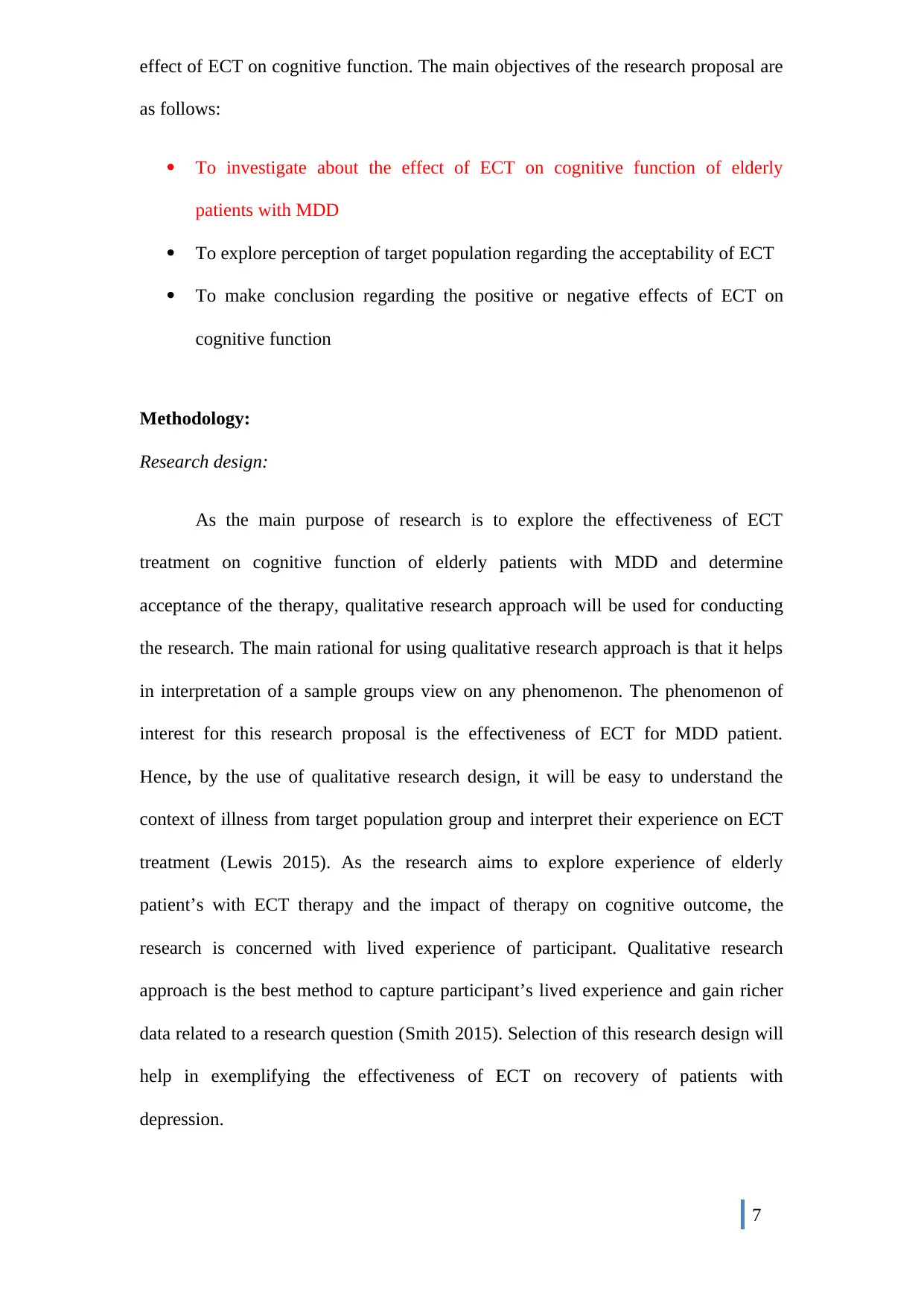
effect of ECT on cognitive function. The main objectives of the research proposal are
as follows:
To investigate about the effect of ECT on cognitive function of elderly
patients with MDD
To explore perception of target population regarding the acceptability of ECT
To make conclusion regarding the positive or negative effects of ECT on
cognitive function
Methodology:
Research design:
As the main purpose of research is to explore the effectiveness of ECT
treatment on cognitive function of elderly patients with MDD and determine
acceptance of the therapy, qualitative research approach will be used for conducting
the research. The main rational for using qualitative research approach is that it helps
in interpretation of a sample groups view on any phenomenon. The phenomenon of
interest for this research proposal is the effectiveness of ECT for MDD patient.
Hence, by the use of qualitative research design, it will be easy to understand the
context of illness from target population group and interpret their experience on ECT
treatment (Lewis 2015). As the research aims to explore experience of elderly
patient’s with ECT therapy and the impact of therapy on cognitive outcome, the
research is concerned with lived experience of participant. Qualitative research
approach is the best method to capture participant’s lived experience and gain richer
data related to a research question (Smith 2015). Selection of this research design will
help in exemplifying the effectiveness of ECT on recovery of patients with
depression.
7
as follows:
To investigate about the effect of ECT on cognitive function of elderly
patients with MDD
To explore perception of target population regarding the acceptability of ECT
To make conclusion regarding the positive or negative effects of ECT on
cognitive function
Methodology:
Research design:
As the main purpose of research is to explore the effectiveness of ECT
treatment on cognitive function of elderly patients with MDD and determine
acceptance of the therapy, qualitative research approach will be used for conducting
the research. The main rational for using qualitative research approach is that it helps
in interpretation of a sample groups view on any phenomenon. The phenomenon of
interest for this research proposal is the effectiveness of ECT for MDD patient.
Hence, by the use of qualitative research design, it will be easy to understand the
context of illness from target population group and interpret their experience on ECT
treatment (Lewis 2015). As the research aims to explore experience of elderly
patient’s with ECT therapy and the impact of therapy on cognitive outcome, the
research is concerned with lived experience of participant. Qualitative research
approach is the best method to capture participant’s lived experience and gain richer
data related to a research question (Smith 2015). Selection of this research design will
help in exemplifying the effectiveness of ECT on recovery of patients with
depression.
7
Paraphrase This Document
Need a fresh take? Get an instant paraphrase of this document with our AI Paraphraser
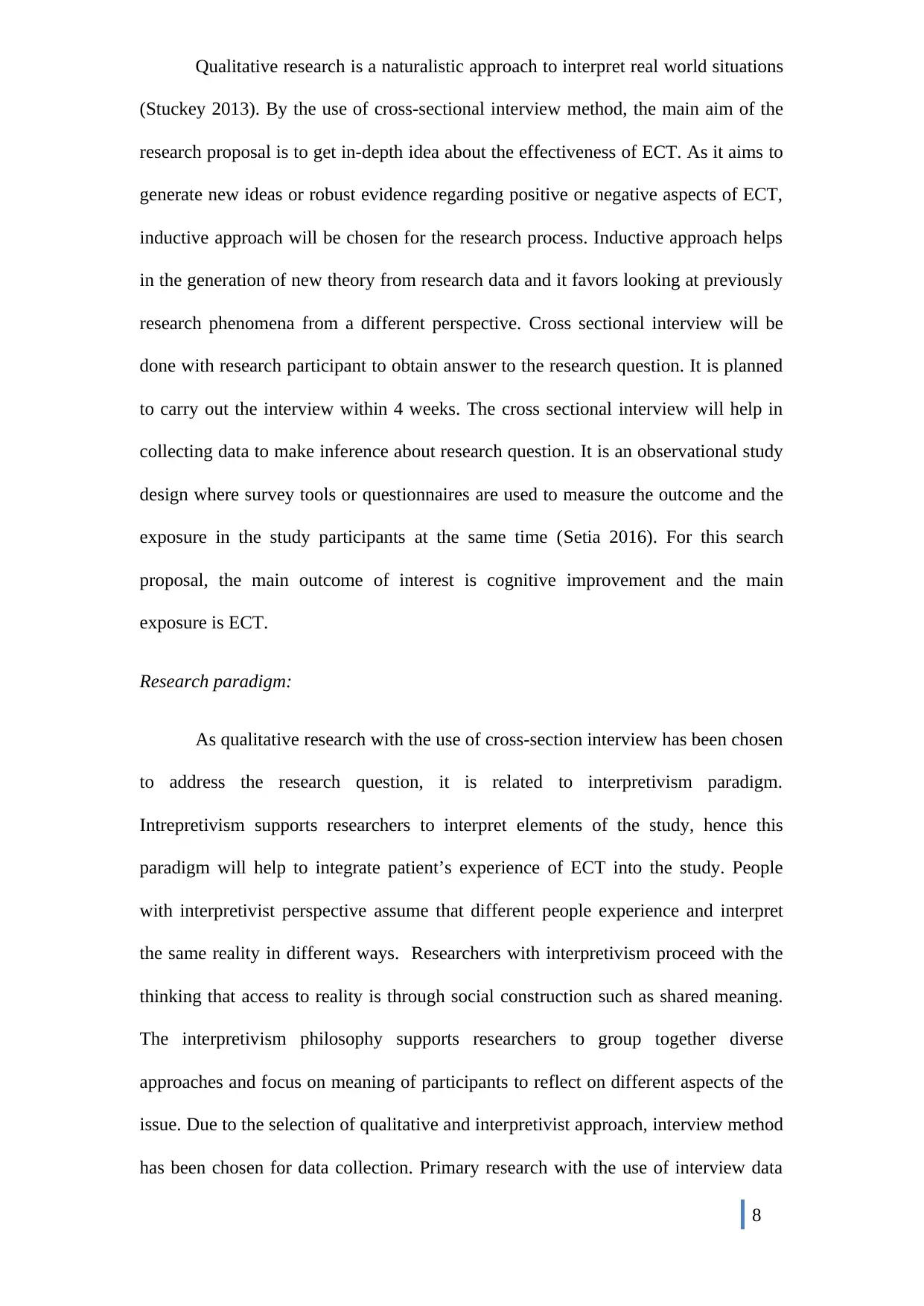
Qualitative research is a naturalistic approach to interpret real world situations
(Stuckey 2013). By the use of cross-sectional interview method, the main aim of the
research proposal is to get in-depth idea about the effectiveness of ECT. As it aims to
generate new ideas or robust evidence regarding positive or negative aspects of ECT,
inductive approach will be chosen for the research process. Inductive approach helps
in the generation of new theory from research data and it favors looking at previously
research phenomena from a different perspective. Cross sectional interview will be
done with research participant to obtain answer to the research question. It is planned
to carry out the interview within 4 weeks. The cross sectional interview will help in
collecting data to make inference about research question. It is an observational study
design where survey tools or questionnaires are used to measure the outcome and the
exposure in the study participants at the same time (Setia 2016). For this search
proposal, the main outcome of interest is cognitive improvement and the main
exposure is ECT.
Research paradigm:
As qualitative research with the use of cross-section interview has been chosen
to address the research question, it is related to interpretivism paradigm.
Intrepretivism supports researchers to interpret elements of the study, hence this
paradigm will help to integrate patient’s experience of ECT into the study. People
with interpretivist perspective assume that different people experience and interpret
the same reality in different ways. Researchers with interpretivism proceed with the
thinking that access to reality is through social construction such as shared meaning.
The interpretivism philosophy supports researchers to group together diverse
approaches and focus on meaning of participants to reflect on different aspects of the
issue. Due to the selection of qualitative and interpretivist approach, interview method
has been chosen for data collection. Primary research with the use of interview data
8
(Stuckey 2013). By the use of cross-sectional interview method, the main aim of the
research proposal is to get in-depth idea about the effectiveness of ECT. As it aims to
generate new ideas or robust evidence regarding positive or negative aspects of ECT,
inductive approach will be chosen for the research process. Inductive approach helps
in the generation of new theory from research data and it favors looking at previously
research phenomena from a different perspective. Cross sectional interview will be
done with research participant to obtain answer to the research question. It is planned
to carry out the interview within 4 weeks. The cross sectional interview will help in
collecting data to make inference about research question. It is an observational study
design where survey tools or questionnaires are used to measure the outcome and the
exposure in the study participants at the same time (Setia 2016). For this search
proposal, the main outcome of interest is cognitive improvement and the main
exposure is ECT.
Research paradigm:
As qualitative research with the use of cross-section interview has been chosen
to address the research question, it is related to interpretivism paradigm.
Intrepretivism supports researchers to interpret elements of the study, hence this
paradigm will help to integrate patient’s experience of ECT into the study. People
with interpretivist perspective assume that different people experience and interpret
the same reality in different ways. Researchers with interpretivism proceed with the
thinking that access to reality is through social construction such as shared meaning.
The interpretivism philosophy supports researchers to group together diverse
approaches and focus on meaning of participants to reflect on different aspects of the
issue. Due to the selection of qualitative and interpretivist approach, interview method
has been chosen for data collection. Primary research with the use of interview data
8
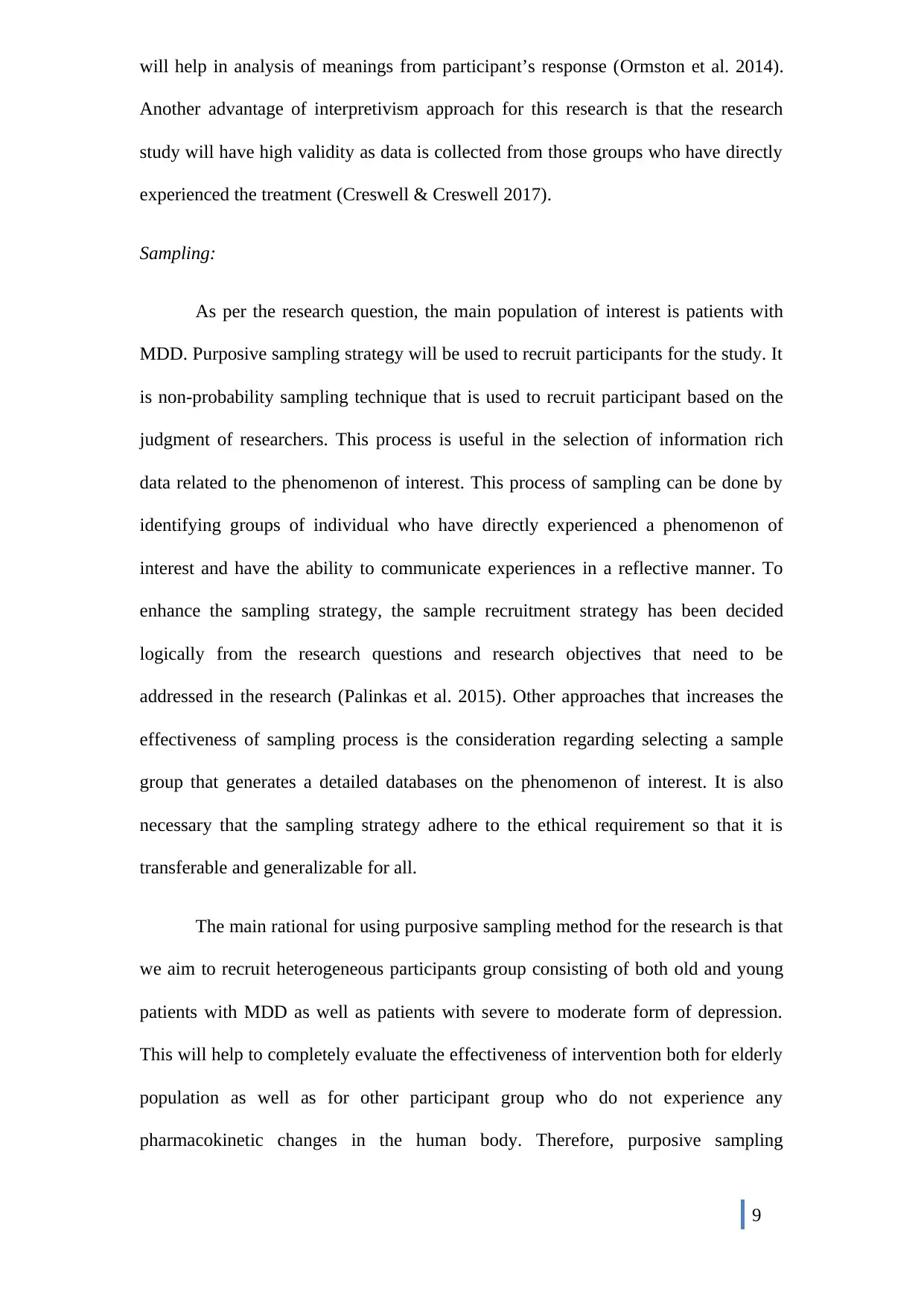
will help in analysis of meanings from participant’s response (Ormston et al. 2014).
Another advantage of interpretivism approach for this research is that the research
study will have high validity as data is collected from those groups who have directly
experienced the treatment (Creswell & Creswell 2017).
Sampling:
As per the research question, the main population of interest is patients with
MDD. Purposive sampling strategy will be used to recruit participants for the study. It
is non-probability sampling technique that is used to recruit participant based on the
judgment of researchers. This process is useful in the selection of information rich
data related to the phenomenon of interest. This process of sampling can be done by
identifying groups of individual who have directly experienced a phenomenon of
interest and have the ability to communicate experiences in a reflective manner. To
enhance the sampling strategy, the sample recruitment strategy has been decided
logically from the research questions and research objectives that need to be
addressed in the research (Palinkas et al. 2015). Other approaches that increases the
effectiveness of sampling process is the consideration regarding selecting a sample
group that generates a detailed databases on the phenomenon of interest. It is also
necessary that the sampling strategy adhere to the ethical requirement so that it is
transferable and generalizable for all.
The main rational for using purposive sampling method for the research is that
we aim to recruit heterogeneous participants group consisting of both old and young
patients with MDD as well as patients with severe to moderate form of depression.
This will help to completely evaluate the effectiveness of intervention both for elderly
population as well as for other participant group who do not experience any
pharmacokinetic changes in the human body. Therefore, purposive sampling
9
Another advantage of interpretivism approach for this research is that the research
study will have high validity as data is collected from those groups who have directly
experienced the treatment (Creswell & Creswell 2017).
Sampling:
As per the research question, the main population of interest is patients with
MDD. Purposive sampling strategy will be used to recruit participants for the study. It
is non-probability sampling technique that is used to recruit participant based on the
judgment of researchers. This process is useful in the selection of information rich
data related to the phenomenon of interest. This process of sampling can be done by
identifying groups of individual who have directly experienced a phenomenon of
interest and have the ability to communicate experiences in a reflective manner. To
enhance the sampling strategy, the sample recruitment strategy has been decided
logically from the research questions and research objectives that need to be
addressed in the research (Palinkas et al. 2015). Other approaches that increases the
effectiveness of sampling process is the consideration regarding selecting a sample
group that generates a detailed databases on the phenomenon of interest. It is also
necessary that the sampling strategy adhere to the ethical requirement so that it is
transferable and generalizable for all.
The main rational for using purposive sampling method for the research is that
we aim to recruit heterogeneous participants group consisting of both old and young
patients with MDD as well as patients with severe to moderate form of depression.
This will help to completely evaluate the effectiveness of intervention both for elderly
population as well as for other participant group who do not experience any
pharmacokinetic changes in the human body. Therefore, purposive sampling
9
⊘ This is a preview!⊘
Do you want full access?
Subscribe today to unlock all pages.

Trusted by 1+ million students worldwide
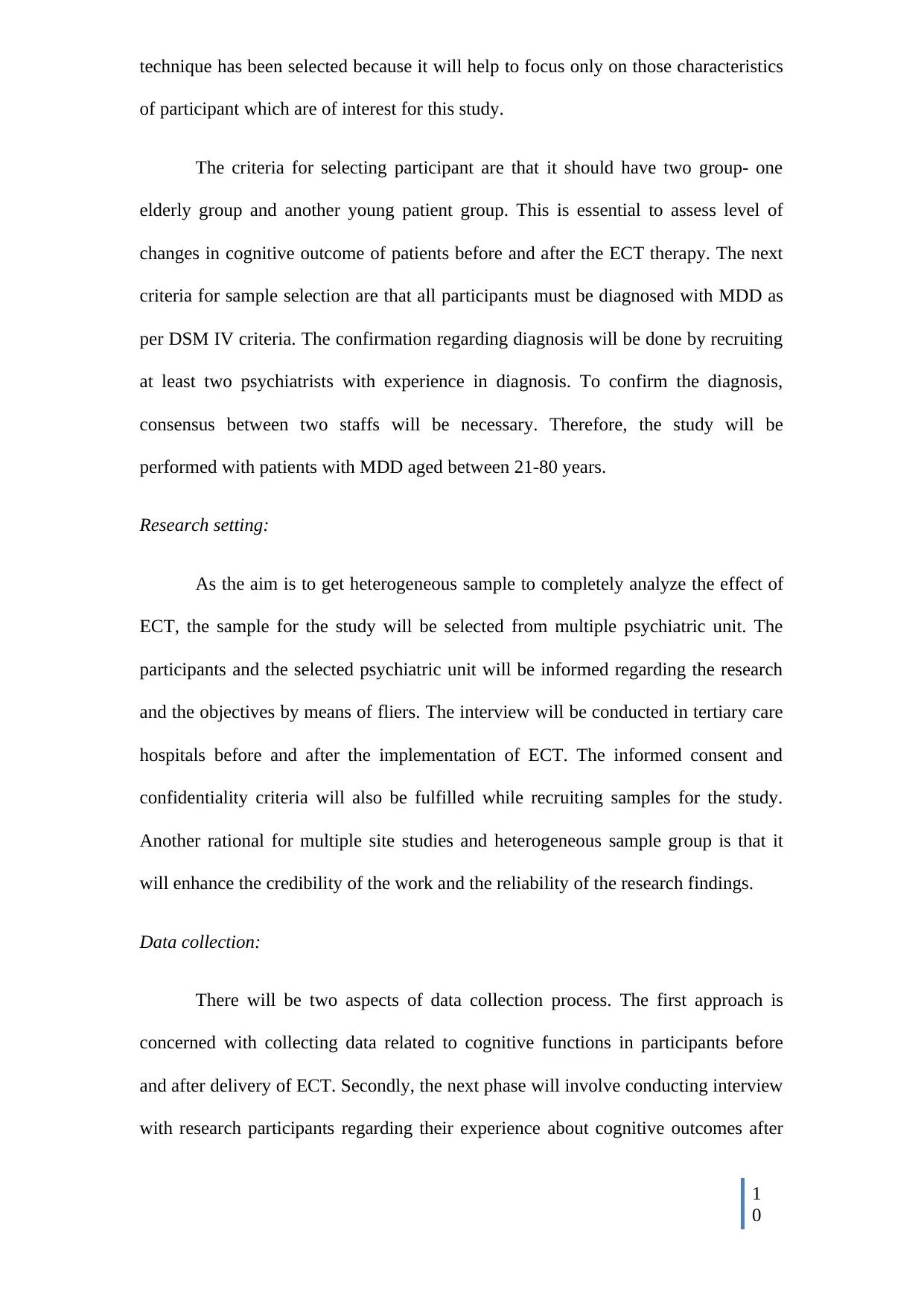
technique has been selected because it will help to focus only on those characteristics
of participant which are of interest for this study.
The criteria for selecting participant are that it should have two group- one
elderly group and another young patient group. This is essential to assess level of
changes in cognitive outcome of patients before and after the ECT therapy. The next
criteria for sample selection are that all participants must be diagnosed with MDD as
per DSM IV criteria. The confirmation regarding diagnosis will be done by recruiting
at least two psychiatrists with experience in diagnosis. To confirm the diagnosis,
consensus between two staffs will be necessary. Therefore, the study will be
performed with patients with MDD aged between 21-80 years.
Research setting:
As the aim is to get heterogeneous sample to completely analyze the effect of
ECT, the sample for the study will be selected from multiple psychiatric unit. The
participants and the selected psychiatric unit will be informed regarding the research
and the objectives by means of fliers. The interview will be conducted in tertiary care
hospitals before and after the implementation of ECT. The informed consent and
confidentiality criteria will also be fulfilled while recruiting samples for the study.
Another rational for multiple site studies and heterogeneous sample group is that it
will enhance the credibility of the work and the reliability of the research findings.
Data collection:
There will be two aspects of data collection process. The first approach is
concerned with collecting data related to cognitive functions in participants before
and after delivery of ECT. Secondly, the next phase will involve conducting interview
with research participants regarding their experience about cognitive outcomes after
1
0
of participant which are of interest for this study.
The criteria for selecting participant are that it should have two group- one
elderly group and another young patient group. This is essential to assess level of
changes in cognitive outcome of patients before and after the ECT therapy. The next
criteria for sample selection are that all participants must be diagnosed with MDD as
per DSM IV criteria. The confirmation regarding diagnosis will be done by recruiting
at least two psychiatrists with experience in diagnosis. To confirm the diagnosis,
consensus between two staffs will be necessary. Therefore, the study will be
performed with patients with MDD aged between 21-80 years.
Research setting:
As the aim is to get heterogeneous sample to completely analyze the effect of
ECT, the sample for the study will be selected from multiple psychiatric unit. The
participants and the selected psychiatric unit will be informed regarding the research
and the objectives by means of fliers. The interview will be conducted in tertiary care
hospitals before and after the implementation of ECT. The informed consent and
confidentiality criteria will also be fulfilled while recruiting samples for the study.
Another rational for multiple site studies and heterogeneous sample group is that it
will enhance the credibility of the work and the reliability of the research findings.
Data collection:
There will be two aspects of data collection process. The first approach is
concerned with collecting data related to cognitive functions in participants before
and after delivery of ECT. Secondly, the next phase will involve conducting interview
with research participants regarding their experience about cognitive outcomes after
1
0
Paraphrase This Document
Need a fresh take? Get an instant paraphrase of this document with our AI Paraphraser
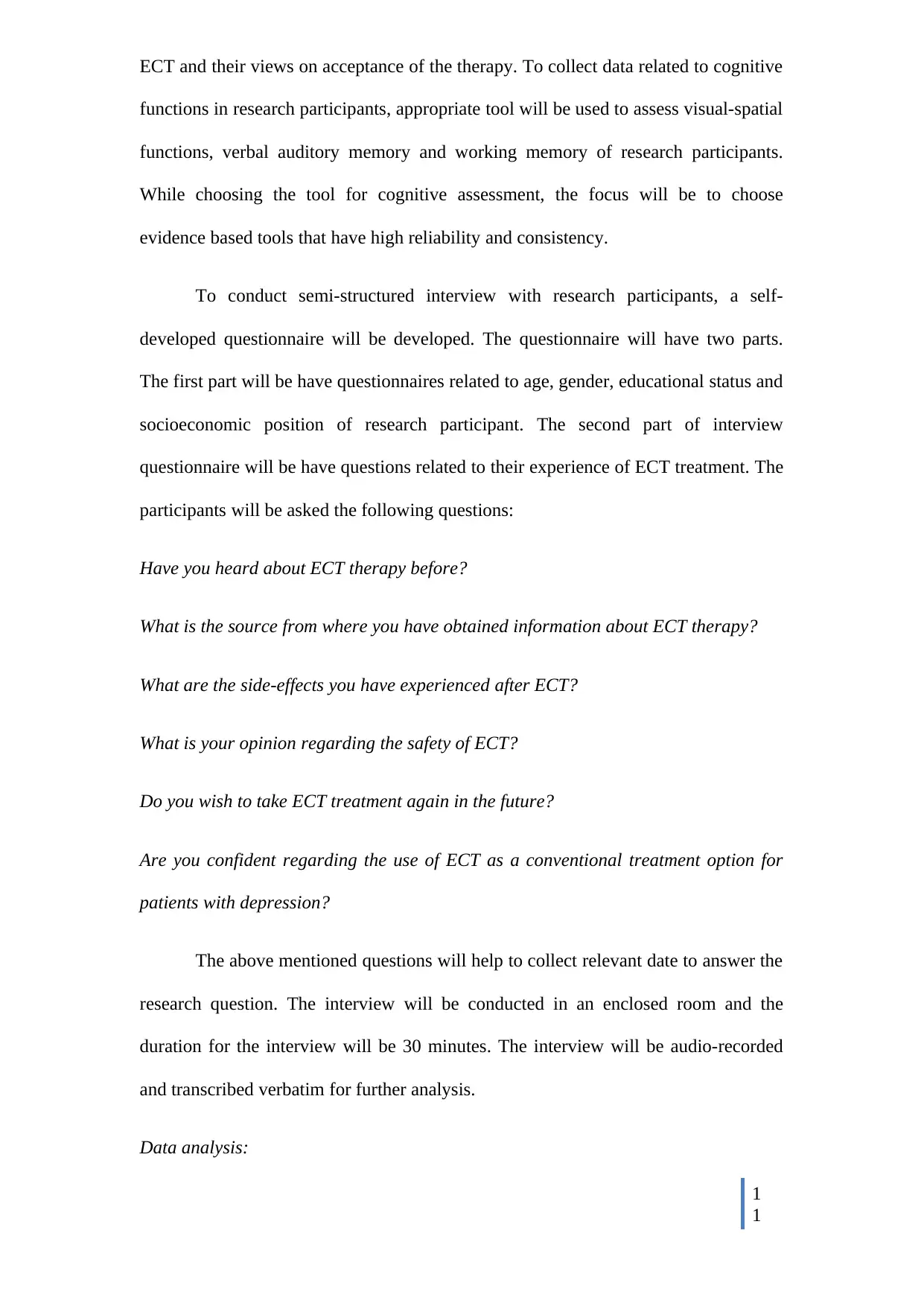
ECT and their views on acceptance of the therapy. To collect data related to cognitive
functions in research participants, appropriate tool will be used to assess visual-spatial
functions, verbal auditory memory and working memory of research participants.
While choosing the tool for cognitive assessment, the focus will be to choose
evidence based tools that have high reliability and consistency.
To conduct semi-structured interview with research participants, a self-
developed questionnaire will be developed. The questionnaire will have two parts.
The first part will be have questionnaires related to age, gender, educational status and
socioeconomic position of research participant. The second part of interview
questionnaire will be have questions related to their experience of ECT treatment. The
participants will be asked the following questions:
Have you heard about ECT therapy before?
What is the source from where you have obtained information about ECT therapy?
What are the side-effects you have experienced after ECT?
What is your opinion regarding the safety of ECT?
Do you wish to take ECT treatment again in the future?
Are you confident regarding the use of ECT as a conventional treatment option for
patients with depression?
The above mentioned questions will help to collect relevant date to answer the
research question. The interview will be conducted in an enclosed room and the
duration for the interview will be 30 minutes. The interview will be audio-recorded
and transcribed verbatim for further analysis.
Data analysis:
1
1
functions in research participants, appropriate tool will be used to assess visual-spatial
functions, verbal auditory memory and working memory of research participants.
While choosing the tool for cognitive assessment, the focus will be to choose
evidence based tools that have high reliability and consistency.
To conduct semi-structured interview with research participants, a self-
developed questionnaire will be developed. The questionnaire will have two parts.
The first part will be have questionnaires related to age, gender, educational status and
socioeconomic position of research participant. The second part of interview
questionnaire will be have questions related to their experience of ECT treatment. The
participants will be asked the following questions:
Have you heard about ECT therapy before?
What is the source from where you have obtained information about ECT therapy?
What are the side-effects you have experienced after ECT?
What is your opinion regarding the safety of ECT?
Do you wish to take ECT treatment again in the future?
Are you confident regarding the use of ECT as a conventional treatment option for
patients with depression?
The above mentioned questions will help to collect relevant date to answer the
research question. The interview will be conducted in an enclosed room and the
duration for the interview will be 30 minutes. The interview will be audio-recorded
and transcribed verbatim for further analysis.
Data analysis:
1
1
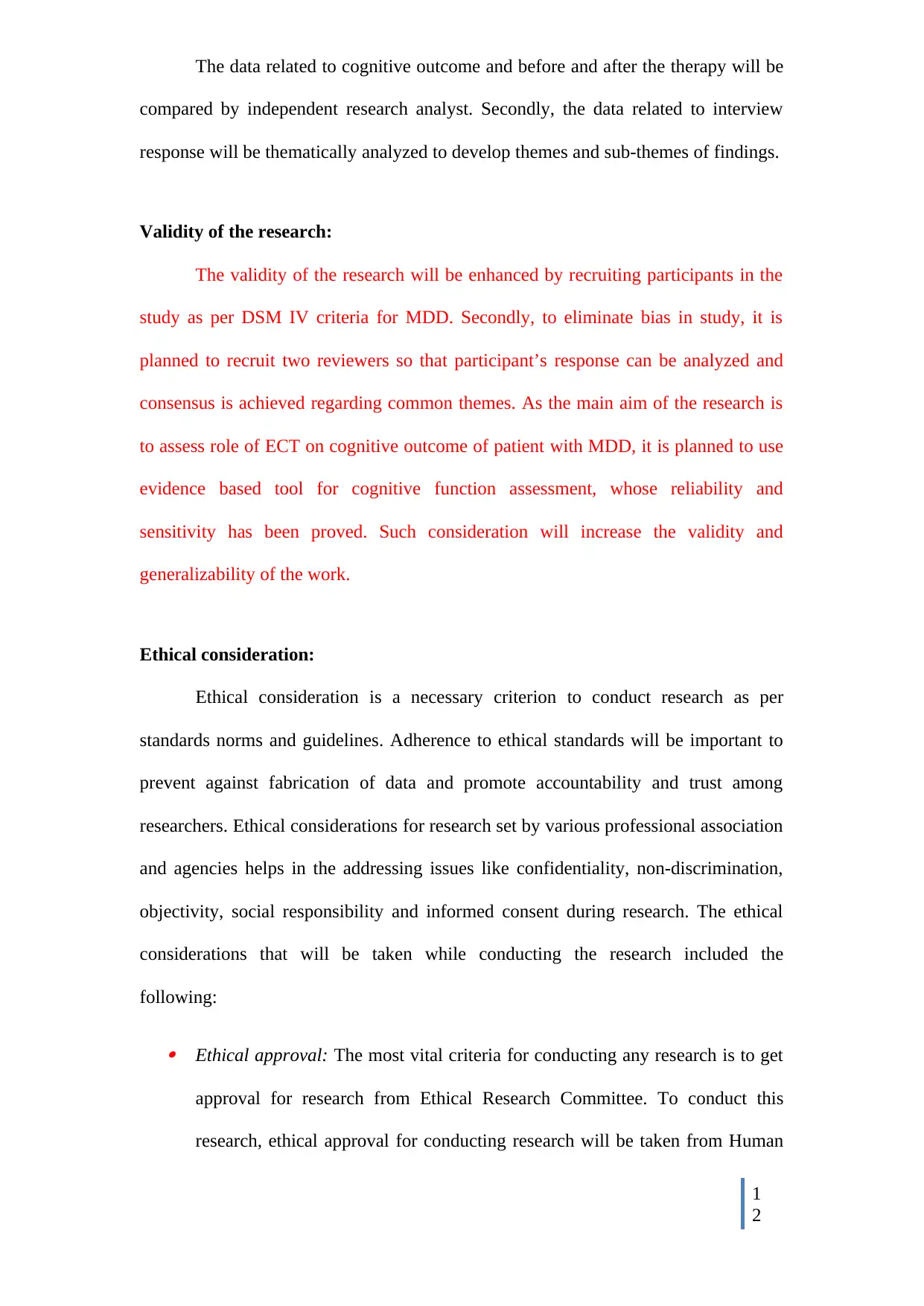
The data related to cognitive outcome and before and after the therapy will be
compared by independent research analyst. Secondly, the data related to interview
response will be thematically analyzed to develop themes and sub-themes of findings.
Validity of the research:
The validity of the research will be enhanced by recruiting participants in the
study as per DSM IV criteria for MDD. Secondly, to eliminate bias in study, it is
planned to recruit two reviewers so that participant’s response can be analyzed and
consensus is achieved regarding common themes. As the main aim of the research is
to assess role of ECT on cognitive outcome of patient with MDD, it is planned to use
evidence based tool for cognitive function assessment, whose reliability and
sensitivity has been proved. Such consideration will increase the validity and
generalizability of the work.
Ethical consideration:
Ethical consideration is a necessary criterion to conduct research as per
standards norms and guidelines. Adherence to ethical standards will be important to
prevent against fabrication of data and promote accountability and trust among
researchers. Ethical considerations for research set by various professional association
and agencies helps in the addressing issues like confidentiality, non-discrimination,
objectivity, social responsibility and informed consent during research. The ethical
considerations that will be taken while conducting the research included the
following:
Ethical approval: The most vital criteria for conducting any research is to get
approval for research from Ethical Research Committee. To conduct this
research, ethical approval for conducting research will be taken from Human
1
2
compared by independent research analyst. Secondly, the data related to interview
response will be thematically analyzed to develop themes and sub-themes of findings.
Validity of the research:
The validity of the research will be enhanced by recruiting participants in the
study as per DSM IV criteria for MDD. Secondly, to eliminate bias in study, it is
planned to recruit two reviewers so that participant’s response can be analyzed and
consensus is achieved regarding common themes. As the main aim of the research is
to assess role of ECT on cognitive outcome of patient with MDD, it is planned to use
evidence based tool for cognitive function assessment, whose reliability and
sensitivity has been proved. Such consideration will increase the validity and
generalizability of the work.
Ethical consideration:
Ethical consideration is a necessary criterion to conduct research as per
standards norms and guidelines. Adherence to ethical standards will be important to
prevent against fabrication of data and promote accountability and trust among
researchers. Ethical considerations for research set by various professional association
and agencies helps in the addressing issues like confidentiality, non-discrimination,
objectivity, social responsibility and informed consent during research. The ethical
considerations that will be taken while conducting the research included the
following:
Ethical approval: The most vital criteria for conducting any research is to get
approval for research from Ethical Research Committee. To conduct this
research, ethical approval for conducting research will be taken from Human
1
2
⊘ This is a preview!⊘
Do you want full access?
Subscribe today to unlock all pages.

Trusted by 1+ million students worldwide
1 out of 34
Related Documents
Your All-in-One AI-Powered Toolkit for Academic Success.
+13062052269
info@desklib.com
Available 24*7 on WhatsApp / Email
![[object Object]](/_next/static/media/star-bottom.7253800d.svg)
Unlock your academic potential
Copyright © 2020–2026 A2Z Services. All Rights Reserved. Developed and managed by ZUCOL.





